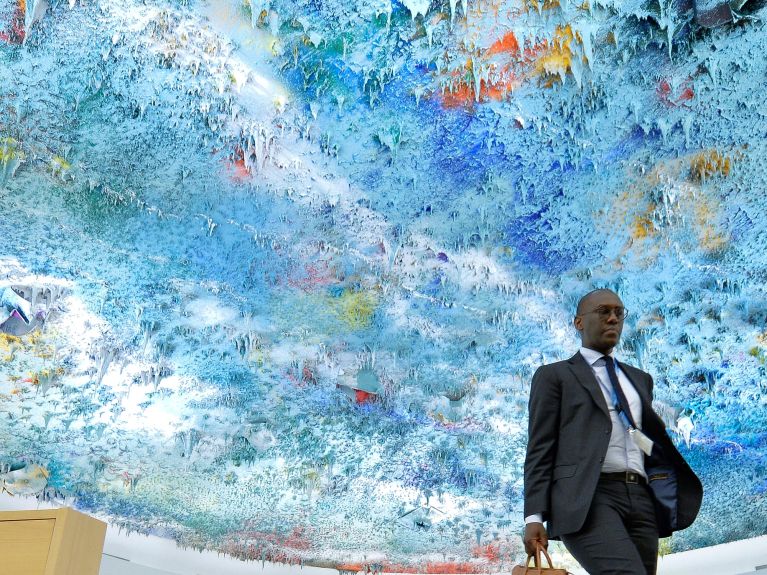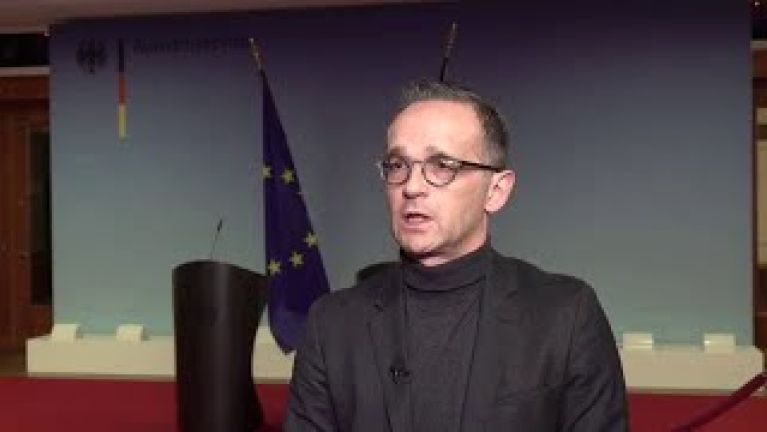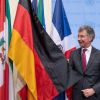“Positively influencing the destinies of many people”
Health, humanitarian affairs and human rights are the main topics at the UN centre in Geneva. Ambassador von Ungern-Sternberg talks about Germany’s responsibilities here.

Geneva is regarded as the operations centre of the United Nations. Ambassador Michael von Ungern-Sternberg on Germany’s contribution towards solving the most pressing issues of our time.

Ambassador von Ungern-Sternberg, Geneva was famous during the Cold War era as a place for secret meetings and agent rendezvous as well as the location for major peace talks. What does the city stand for today?
This UN location is much more difficult to sum up than the one in New York. The UN has rather clear structures there – with the General Assembly, the Security Council and the Secretariat. Geneva, on the other hand, hosts the headquarters of large numbers of international organisations with sometimes very different responsibilities, mandates and foundation histories, and furthermore peace negotiations are constantly held here.
Which organisations are you thinking of here, for example?
The range is considerable. It reaches from the World Trade Organization (WTO) to the UN High Commissioner for Refugees (UNHCR) and the Human Rights Council to the World Health Organization (WHO), International Labour Organization (ILO) and World Intellectual Property Organization (WIPO). There are also numerous non-governmental bodies, such as the International Committee of the Red Cross. Some 100 international organisations are based here.
Protecting human rights is an ongoing struggle.
Is it possible to identify one specific profile here or is there simply a random collection of different institutions?
In a nutshell, Geneva is the centre for the Sustainable Development Goals, or SDGs, and for human rights. This is where above all the subjects of health, humanitarian affairs and social issues take place, topics that cover most of the SDGs. Geneva is regarded as the operational centre of the United Nations.
Does that mean it’s an independent UN centre?
Geneva is part of the large UN family. However, this also includes organisations that have completely independent decision-making bodies. That applies, for example, to the ILO, the WHO and the WTO. In other words, Geneva complements the work of New York. There, in simple terms, questions of peace and security play a much more prominent role, whereas here the emphasis is more on the social and humanitarian issues and trade questions I just mentioned.
Dieses YouTube-Video kann in einem neuen Tab abgespielt werden
YouTube öffnenThird party content
We use YouTube to embed content that may collect data about your activity. Please review the details and accept the service to see this content.
Open consent formSo it’s not as important for you that Germany has again been a non-permanent member of the Security Council since the beginning of the year?
You can’t really say that. Certainly, the immediate work on that is done in New York. During this period, however, Germany has also resolved to draw attention to different issues than those that were perhaps once customary in the Security Council – for example, human rights and climate protection – because we have a broader concept of security. The danger of critical developments is especially great in countries where human rights are not respected. There are clear links here that we would like to present more strongly in the Security Council. And because some of the relevant organisations are based in Geneva, membership of the Security Council naturally also requires us to act here. We would like to bring Geneva and New York closer together.
You referred to human rights. The Human Rights Council is regularly criticised as weak or even as a kind of fig-leaf activity. What is your view of the Council?
That’s not how we see it. It is clear that protecting human rights is an ongoing struggle. That is why we have put the subject on our agenda for the non-permanent membership of the Security Council. Nevertheless, I consider it misguided to describe the Human Rights Council as obsolete and ineffective. Several years ago, it superseded the former Human Rights Commission in the wake of an important reform; as a result, the relative weight of the Western world was reduced a little. That presented some with grounds for criticism.
Criticism that you don’t share?
I believe it is the prevailing opinion in Geneva that the Human Rights Council has acquired greater credibility and also greater authority. We have mechanisms today that did not exist then and now contribute to improving the human rights situation worldwide.
Can you give an example?
For example, the Universal Periodic Review or what is known simply as the UPR process. This review procedure has existed since 2007, and every country has to undergo it at regular intervals. Germany is scrutinised here in the same way as Cambodia or Rwanda, China, Saudi Arabia or the USA. After reviews in 2009 and 2013, it was most recently our turn in 2018. Potential human rights violations are examined very carefully – for example, with regard to the treatment of migrants, gender equality and many other issues. And in the course of its next review, each country has to report on what it has done in the intervening period.
Dieses YouTube-Video kann in einem neuen Tab abgespielt werden
YouTube öffnenThird party content
We use YouTube to embed content that may collect data about your activity. Please review the details and accept the service to see this content.
Open consent formNonetheless, the USA has turned its back on the body…
We regret that very much, because Germany does not share any of this scepticism towards multilateral structures. Certainly, the work of the Council could be further improved, but in its present form it represents a significant advance on the past. Incidentally, it is interesting how the United States has withdrawn from the Council, but still took part in the UPR process.
The American government’s fundamental doubts about the United Nations remain, however. Just think of the climate agreement or the Iran deal.
We have a different opinion on that. We think that multilateral organisations are needed today more than ever. Of course, they must work effectively and be politically credible, but we cannot overcome the major problems of our time without them. We cannot accomplish that by bilateral means. We are working with our partners from all continents to strengthen multilateral forums and find answers to the most pressing questions of our age.
The League of Nations failed in Geneva. Do you therefore feel you have a special responsibility for the continued existence of the United Nations, especially now that multilateralism is under pressure?
We carry on working as usual, because Germany is convinced there is no alternative to international cooperation. We need to show patience and provide proof that UN institutions are important and can contribute to the ambitious goals – maintaining peace and security, economic progress and respect for human rights.
There are also tensions in relations with the USA on the subject of world trade. The WTO is based in Geneva. What role does it play in this dispute?
A very important one. The USA has – in our view, unjustly – levied tariffs on steel. That contravenes the rules and the spirit of the WTO. Talks to resolve this trade dispute are taking place at many levels, including here in Geneva, directly in or on the edges of the WTO. The EU – and with it its largest economy Germany – is attempting to exercise a moderating influence on the United States. In addition, it is working hard to find solutions with China within the WTO framework, for example, to better control government subsidies or prevent forced technology transfer. Here we share common concerns with the USA.
The USA is also criticising the WTO itself and questioning its legitimacy.
That’s true. The USA is above all critical of the Appellate Body in the WTO dispute settlement system, to which any member state can turn when it sees violations of international trade rules. Its decisions are effectively binding. The USA accuses the body of having appropriated powers that were never intended. That’s why it is currently blocking the appointment of Appellate Body members. If this practice doesn’t end shortly there will soon be no more members available. This court of appeal will then collapse and it will no longer be possible for cases to be brought to a conclusion.
What can you do to prevent that?
We have drawn up proposals at the EU level and are negotiating on them with the USA. The end of the Appellate Body would represent a major threat to free, rules-based world trade because it is where many disputes have been settled in the past.
Among all these issues – world trade, the refugee crisis, human rights and global epidemics – where does Germany’s special emphasis lie in Geneva?
We attempt to make constructive contributions in many areas here, because, as I said earlier, we consider softer security factors important and those are precisely what are dealt with here in Geneva. With regard to the global situation, it’s obvious we have to do more on prevention. We are now the second largest bilateral donor in the field of humanitarian assistance. We also engage closely with 20 to 30 of the organisations based here.
Can you already predict what will keep you especially busy in the coming months?
You can never really be sure of that. The UN is a reflection of the world, which is rather unsettled at the moment. But trade issues will undoubtedly keep us on our toes, as will the situation in Yemen, where an unimaginable humanitarian crisis is taking place. Fortunately, there has recently been movement here. The advances made at talks in Sweden at the end of 2018 now need to be consolidated. We in Geneva and we as Germans certainly only play a small part in events, but we want to contribute towards saving as many people as possible.
What do you personally find most fascinating about the job in Geneva?
The variety of issues and responsibilities that constantly present new challenges. From Geneva we can have a positive influence on many people’s lives in very concrete ways. That becomes especially clear on issues such as health, refugees and humanitarian assistance for conflict regions.
Interview: Friederike Bauer
You would like to receive regular information about Germany? Subscribe here:




